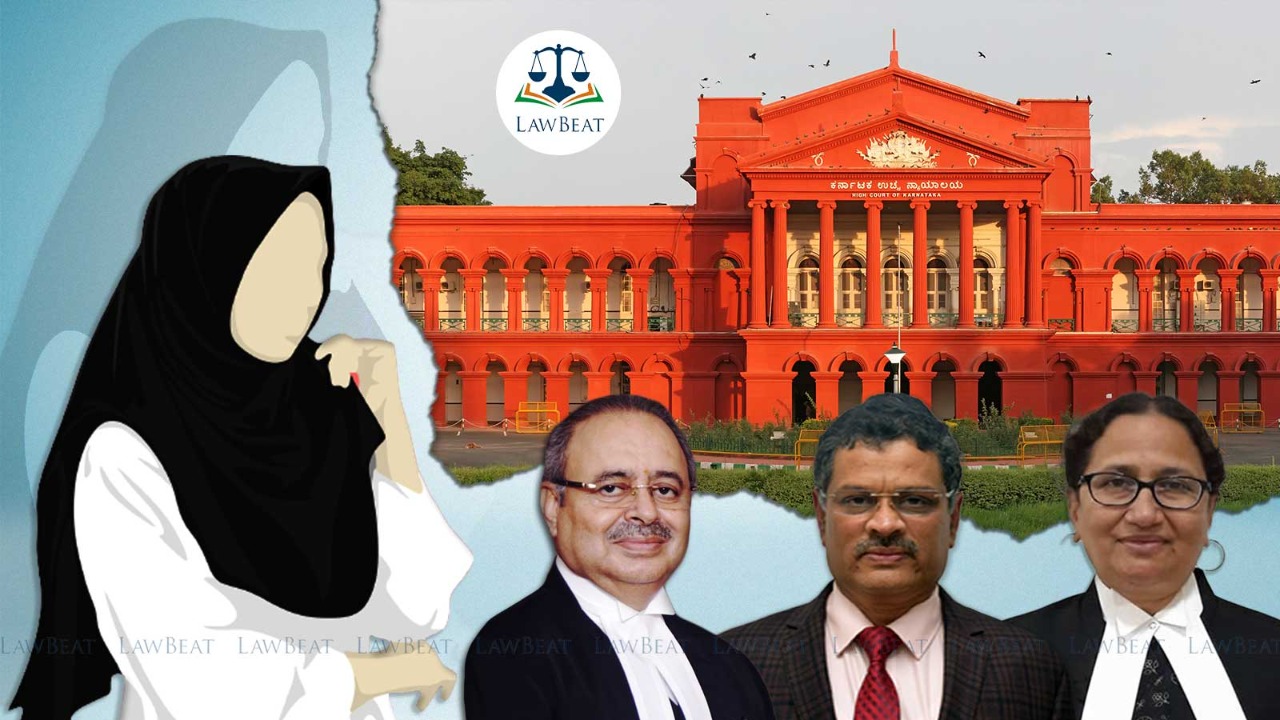“Our endeavour should be to ensure that students go back to schools and college”: Karnataka High Court tells counsels arguing Hijab matter

A Karnataka High Court bench headed by Chief Justice Ritu Raj Awasthi and consisting of Justices Krishna Dixit and JM Khazi has remarked that the endeavour of all the parties involved in the Hijab litigation should be “that the education of the students should start and without any difficulty. There should be an arrangement for this purpose.”
The Court was hearing plea(s) by girl students challenging the alleged ban of wearing Hijab in government pre-university colleges in Udupi district. When the hearing for the matter began, Sr. Adv. Sanjay Hegde, appearing for one of the petitioners, submitted that he would like to make submissions and stated the facts on behalf of the petitioners.
He submitted that uniforms are mandatory only for schools and that there is no provision in Karnataka Education Act, 1983 and the subsequent rules under the Act to penalise any student for not wearing uniforms properly.
However as the arguments progressed, Sr. Adv. Devadatt Kamat, who was appearing for parties who had challenged the Government Order dated February 5, submitted that there is a need for the Court to hear the petitioners and the respondents on whether there should be an arrangement till the litigation ends.
Advocate General Prabhuling Navadgi submitted that, “Pursuant to these petitions being filed before the Court a large amount of commotion took place. So the State had to close down the institutions till Friday. A conducive arrangement has to be made.”
He reiterated the State’s earlier stand that the State in its GO has left it to the Development Councils of the colleges to fix a uniform and that the State has not mandated anything to the colleges with regard to uniforms.
The AG said, “As a State we are concerned with the plight of the students. We want our students back to the education institutions. Let the institutions decide the dress code as per the GO.”
Kamat at this point submitted, "The students will wear their uniform. They will also wear a head scarf. Let this situation continue. In the meanwhile, it is their customary practice. Hijab does not harm anybody. Let them continue wearing uniform and head scarf in same colour."
He argued that the State is playing with ‘fire’ by leaving it to the colleges to decide on the uniform.
At this point, Hegde interjected and submitted that he would like to conclude his arguments.
He said, "The fire needs to be doused before it becomes big here. The wisdom lies in trying to find a middle path.”
Continuing with his legal arguments, he read out from Bijoe Emmanuel & Ors vs State Of Kerala & Ors to establish what essential religious practice is under Article 25 of the Constitution. He further read from the 2017 judgment of Supreme Court in Justice Puttuswamy & And Vs Union of India & Ors to establish that wearing the Hijab is covered under 19(1)(A) ie. Right to privacy. He concluded by urging the Court to use the balance of convenience test and pass an interim order in favour of the students.
Kamat arguing for the quashing of GO submitted that the reasoning of the GO is based on 3 judgments of different High Courts which did not establish that Hijab is not an essential religious right.
The Court however questioned Kamat and said “Come to the operative portion of the GO. The institutions and the persons on whom this is binding need to go by the operating portion.” The Court further told him, “They have considered this judgement while issuing the GO. They had to balance the rights of religion and rights of the college. You said there is a non-application of mind because of this judgment, so what is wrong now?”
Kamat quoted the judgment of Madras High Court in Ajmal Khan vs Election Commission of India (ECI), wherein the petitioners sought mandamus forbearing the Election Commission from publishing or releasing the Electoral Rolls with the photographs of eligible women voters particularly Muslim Gosha Women.
It was contended before Madras High Court that this practice of the Election Commission violates Article 25. According to Kamat the Court held that while publishing or releasing the photos with electoral polls cannot be quashed, the Muslim women had the right to wear Hijab for the photograph since it is an essential religious practice.
Kamat further read out from verses of the Quran to establish that wearing Hijab is an essential religious practice. However, due to paucity of time, the Court asked him to resume his submissions on February 14, 2022 at 2.30 pm while indicating that they will pass an order asking students not to wear any clothing religious in nature to the education institutions.
Cause Title: Resham vs State of Karnataka
